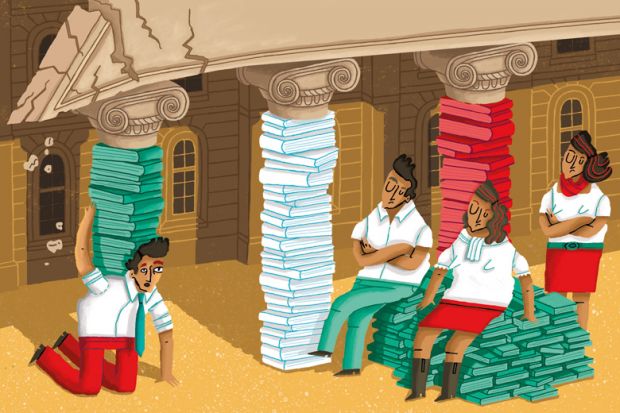UK academics who dislike the research excellence framework often suggest boycotting it. But could it ever really happen? And what would the consequences be?
Italy provides some evidence. The country has its own version of the REF, known as the VQR (“Evaluation of Research Quality”). Academics were required to submit, by 15 March, two publications published between 2011 and 2014 to be assessed via a hybrid system of peer review and metrics. But Italian universities are in turmoil because of the refusal of large numbers to do so.
According to Anvur, the government agency managing the VQR, the refuseniks account for 8 per cent of Italy’s academics, but they are distributed unevenly. Less than 1 per cent of academics at the Ca’ Foscari University of Venice joined the boycott. However, the Sapienza University of Rome – Italy’s largest university – reported rates of about 14 per cent, the University of Pisa 23 per cent and the University of Salento more than 29 per cent. This will have serious financial consequences because the fraction of higher education funding assigned on the basis of the VQR is due to rise from 16 per cent in 2016 to 24 per cent by 2020. It is probably with this in mind that Anvur reopened the submission process two weeks after the original deadline, with a new deadline of 15 April. Some rectors took the opportunity to select and submit papers by academics participating in the protest.
The concern expressed by the Conference of Rectors of Italian Universities (CRUI) is ironic. Its former president wrote last summer to Italy’s prime minister threatening a VQR boycott in protest against a 20 per cent drop in public funding over the past five years, which has pushed the proportion of Italy’s gross domestic product spent on higher education below that of almost every other developed country and accelerated a 19 per cent decline in the number of tenured positions since 2008. By the time the new CRUI president withdrew the threat last autumn, the #stopVQR initiative had gained significant momentum.
Fearing for their budgets, rectors responded with both carrots and sticks. A few weeks before the submission deadline, the CRUI announced a “university spring day”, on which every campus would hold a debate about the problems facing Italian universities. Meanwhile, Pisa suspended all planned appointments, promotions and payment of research expenses until the effect of the boycott on its budget is ascertained. And the University of Pavia announced that future resources would be distributed to departments on the basis of their VQR results: hence, fewer protesters means more resources.
The #stopVQR movement contains at least three wings. The first objects to the freezing of academic salaries since 2010, exacerbated by the government’s decision to disregard the years 2011 to 2015 in pension calculations (a measure not imposed on any other public sector workers). The more than 14,000 professors who signed a petition promoted by Carlo Ferraro, a professor of engineering at the Polytechnic University of Turin, argue that they should not be evaluated for a period that will not count in calculating their years of service.
The second wing is focused on research funding. Giuseppe Mingione, a highly cited mathematician at the University of Parma, complained in a newspaper interview that in the past four years he had received only €2,500, compared with 100 times that among collaborators abroad.
The third wing objects to the VQR on principle. According to Stefano Semplici, a professor of philosophy at the University of Rome II – Tor Vergata, it pushes professors to neglect teaching and provides a curtain behind which reductions in resources and student grants can be hidden. After the previous VQR, funding allocations shifted from poor southern universities to wealthy northern ones, exacerbating the former’s problems with shrinking resources, staff and students. Protesters also object to the VQR’s enormous cost and methodological weaknesses. These are set out on the blog Roars.it, which has had more than 13 million hits since 2011.
Recently, two controversies gained national attention. The first regards the salaries of Anvur board members, which account for about 16 per cent of its total budget. The second relates to board appointments, which required the 15 candidates to write a position paper. Among the four chosen by Stefania Giannini, the minister of education, universities and research, was Paolo Miccoli, professor of surgery at Pisa. During scrutiny by a parliamentary commission, one member noted that entire sentences of Miccoli’s paper were drawn from four uncited sources. Yet his appointment was still approved.
It is too early to say whether the #stopVQR protest will achieve its objectives. But one thing is clear: active academic resistance to research assessment can make university leaders take notice in a way that no amount of grumbling in the common room can.
Alberto Baccini is professor of economics at the University of Siena and Giuseppe De Nicolao is professor of control and systems engineering at the University of Pavia. They are both on the editorial board of Roars.it.
POSTSCRIPT:
Print headline: Academics in Italy have boycotted assessment. What has it achieved?
Register to continue
Why register?
- Registration is free and only takes a moment
- Once registered, you can read 3 articles a month
- Sign up for our newsletter
Subscribe
Or subscribe for unlimited access to:
- Unlimited access to news, views, insights & reviews
- Digital editions
- Digital access to THE’s university and college rankings analysis
Already registered or a current subscriber?




